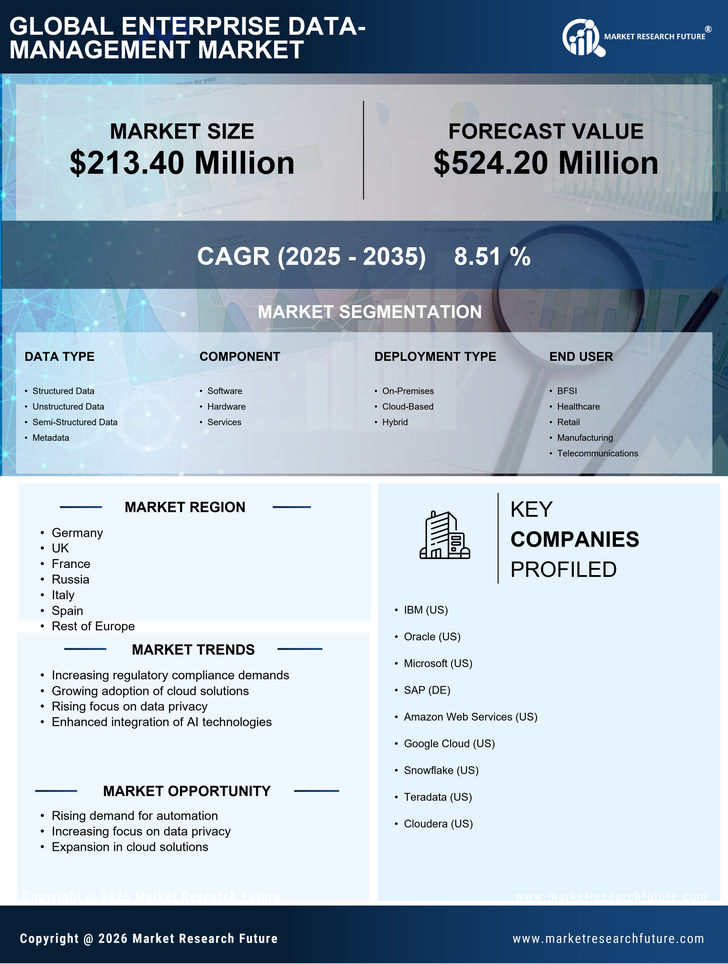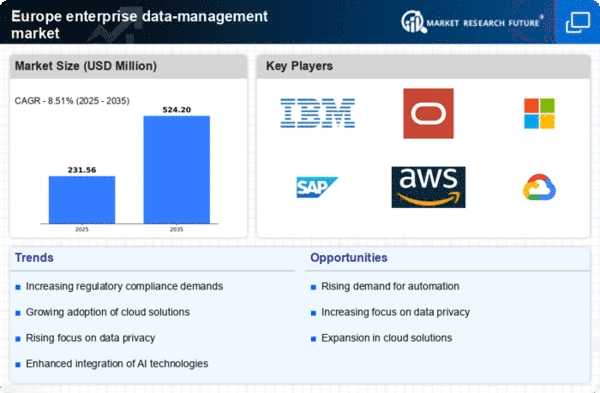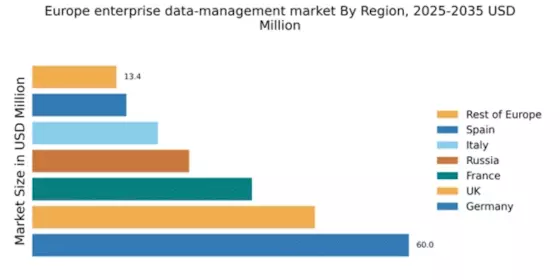Rising Data Volumes
The exponential growth of data generated by businesses in Europe is a critical driver for the enterprise data-management market. With estimates suggesting that data volumes are expected to increase by 30% annually, organizations are faced with the challenge of effectively managing this influx. This surge in data necessitates advanced data management solutions that can handle large datasets efficiently while ensuring data integrity and accessibility. Companies are increasingly recognizing the importance of scalable data management systems that can adapt to growing data needs. Consequently, investments in enterprise data-management technologies are likely to rise, as businesses seek to leverage data for strategic decision-making and operational efficiency. The ability to harness vast amounts of data could provide a competitive edge, further stimulating demand in the enterprise data-management market.
Regulatory Compliance Pressure
The enterprise data-management market in Europe is experiencing heightened pressure due to stringent regulatory frameworks such as the General Data Protection Regulation (GDPR). Organizations are compelled to adopt robust data management practices to ensure compliance, which may involve significant investments in technology and personnel. The need for transparency and accountability in data handling is paramount, as non-compliance can result in hefty fines, potentially reaching up to €20 million or 4% of annual global turnover. This regulatory landscape drives enterprises to enhance their data governance frameworks, thereby propelling growth in the enterprise data-management market. As companies strive to align with these regulations, the demand for comprehensive data management solutions is likely to increase, fostering innovation and competition within the industry.
Increased Focus on Data Security
In an era where data breaches and cyber threats are prevalent, the enterprise data-management market in Europe is witnessing a pronounced emphasis on data security. Organizations are increasingly aware of the potential risks associated with inadequate data protection measures, which can lead to financial losses and reputational damage. As a result, there is a growing demand for data management solutions that incorporate advanced security features, such as encryption and access controls. Recent surveys indicate that over 60% of European companies consider data security a top priority in their data management strategies. This focus on safeguarding sensitive information is likely to drive investments in enterprise data-management technologies that offer enhanced security capabilities. Consequently, the market is expected to evolve, with a greater emphasis on solutions that not only manage data but also protect it from emerging threats.
Digital Transformation Initiatives
Digital transformation is reshaping the enterprise data-management market in Europe, as organizations seek to modernize their operations and enhance customer experiences. The integration of digital technologies into business processes requires effective data management strategies to support new digital initiatives. Companies are increasingly investing in data management solutions that facilitate real-time data access and analytics, enabling them to respond swiftly to market changes. According to recent studies, approximately 70% of organizations in Europe are prioritizing digital transformation, which inherently drives the need for robust data management frameworks. This trend indicates a shift towards data-centric business models, where data management becomes a cornerstone of operational success. As enterprises embark on their digital journeys, the demand for innovative data management solutions is expected to grow, significantly impacting the enterprise data-management market.
Emergence of Data-Driven Decision Making
The shift towards data-driven decision making is significantly influencing the enterprise data-management market in Europe. Organizations are increasingly recognizing the value of data as a strategic asset, leading to a demand for sophisticated data management solutions that enable effective analysis and reporting. This trend is underscored by the fact that approximately 80% of executives in Europe believe that data-driven insights are crucial for competitive advantage. As businesses strive to make informed decisions based on accurate data, the need for comprehensive data management frameworks becomes evident. This shift is likely to drive investments in technologies that facilitate data integration, quality assurance, and analytics capabilities. The enterprise data-management market is poised for growth as organizations seek to harness the power of data to enhance operational efficiency and drive innovation.


















